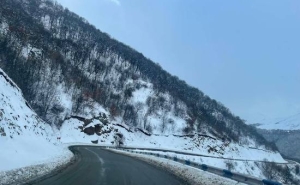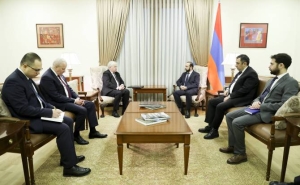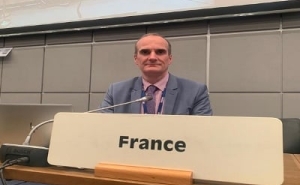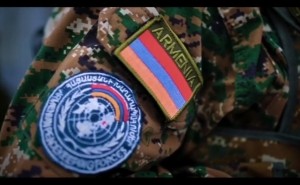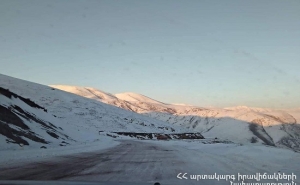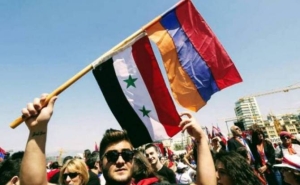Republican Party of Armenia and Its Foreign Policy Priorities: Interview with Artak Zakaryan (EXCLUSIVE)
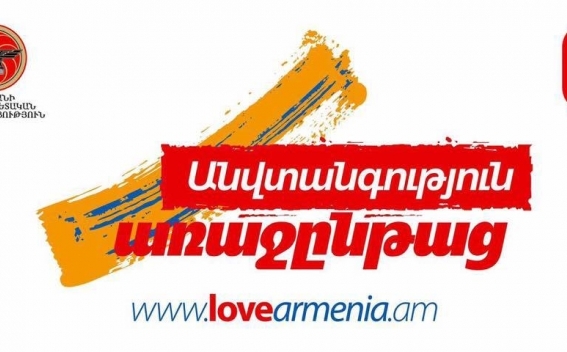
As a result of April 2 Parliamentary elections of the RA 4 political forces will enter the RA National Assembly. These forces will define the foreign political course of the country. "Armedia" IAA presents interviews with the representatives of political forces conducted during the campaign on their foreign policy priorities.
"Armedia’’ IAA presents an exclusive interview with the representative of Republican Party of Armenia, the head of the Committee of Foreign Affairs of the RA National Assembly, Artak Zakaryan.
- Will you, please, name the three main priorities of the foreign policy directions of your political power?
- The Republican Party of Armenia has set priorities and guidelines for the country’s foreign policy, the aim of which is to ensure good relations with neighboring countries and establishing and maintaining stable relations, natural integration with the international community, the increase of the role of Armenia in it, development of mutually beneficial political, economic, cultural and other contacts with other countries of the world.
- What is your position on Karabakh conflict settlement process?
- As it has many times been mentioned from the highest level, the position of the Republic of Armenia on the solution of Karabalkh conflict greatly depends on the free self-determination of Karabakh people. Our aim is that the final status of Karabakh is determined by the people of the de-facto established country. We will not quit this principle. Our approach is clear – we will support the efforts of the OSCE MG Co-Chairs to carry out peaceful negotiation process for reaching a just solution.
At the same time we will periodically improve our defense capabilities, so that the Azerbaijani side does not think that there can also be other ways for solution. We will work in the direction of engaging Artsakh Republic in the negotiations as a full party.
- Do you consider it possible to restore the Armenian-Turkish relations in the near future? What is the key to progress in this direction? And what steps should be taken for the international recognition of the Armenian Genocide?
- In 2009 when initiating the process of the settlement of Armenian-Turkish relations without preconditions, Armenian authorities fully imagined all the variants of further development. Turkey was given an opportunity to open the border closed by it and settle the relations. However, that opportunity, unfortunately, was not used because of the absence of political will of the Turkish authorities.
Moreover, Turkey continues its denial policy of the Armenian Genocide and the policy of editing the history. Taking into consideration all this in 2015 the RA President decided to call back the protocols of October 10, 2009 signed in Zurich from the RA National Assembly – protocols "Establishing Diplomatic Relations Between the Republic of Armenia and the Republic of Turkey" and "Developing Relations Between the Republic of Armenia and the Republic of Turkey".
Now the ball is in Turkey’s court. If in the future Turkey refers to the ratification of the negotiated protocols, maybe certain developments also take place here.
As for the international recognition of the Armenian Genocide, this is a live process. Thirty countries have already recognized the Armenian Genocide. We will continue our efforts in keeping the issues of prevention of condemnation of the crime of genocide, as well as the issue of the elimination of their consequences on the international agenda.
- What is your approach towards Armenia’s integration processes? How do you see the development of Armenia's bilateral relations with the US, the Russian Federation and with individual European countries?
- As it has been mentioned for many times, the foreign policy of Armenia was formed based on complementary approach, on the coordination of the interests of the major powers and international organizations involved in the region. During the years of the establishment of our statehood, the RA has conditioned its foreign policy integration processes by being engaged in mutually harmonious different systems. By becoming a member of the CSTO the RA has at the same time developed its partnership relations with NATO. Being a partner country for NATO, we consider Russia as our strategic ally.
Armenia cooperates with Russia in the context of ensuring security, economic development and stability. We will bring our strategic partnership with Russia at a new level.
Relations with the US have their place in Armenia’s foreign policy. The agenda of the bilateral relations includes different fields – political, economic, humanitarian, security, etc. In all these fields our cooperation is described as effective. During the new American administration, we will give a new impetus to our relations with the US.
We also attach great importance to the development of bilateral relations with individual European countries, as well as to the disclosure of the possible potential of the development of those relations. We will continue developing our relations with France, Germany, Greece, other European countries based on our common civilizational values.
The membership to the Eurasian Economic Union opened new opportunities for the economic development of our country. In this regard we will support our partners in fully implementing all the opportunities given by the Eurasian Economic Union.
In the process of implementing reforms in our country cooperation with the EU is of great importance. We will continue deepening our cooperation with the EU based on the new legal framework.
- How do you see the development of the relations of the RA with the neighboring countries, particularly with Iran and Georgia? What steps are needed in this direction?
- During the recent years activation of high-level contacts in Armenia-Georgia relations has been registered. The strong basis of the relations between Armenia and Georgia is conditioned by the centuries’ long friendly relations between the two nations. The basis of the bilateral relations is the creation of a relevant agenda of mutually interesting and important issues, as well as the using effective mechanisms for operative solution of the existing problems.
As for the RA-Iran relations, then both Iran and Armenia are eager to do their best for the development and strengthening of the relations. Practical steps are being done in this direction. At the end of 2016 high level Armenian-Iranian negotiations took place at the RA Presidential palace, as a result of which several documents were signed between Armenia and Iran for deepening bilateral cooperation on different field.
There is a bilateral agenda on different issues, there is a mutual commitment on implementing those projects. The both sides attach importance to constantly held political consultations, to trade-economic, energy, transportation, agriculture, education, health issues, to the issues of promoting contacts between business circles.
There is an agreement between Armenia and Iran, according to which the sides continue exchange of gas and electricity. We will give a new impetus to our relations with Iran and Georgia especially putting the main emphasis on the realization of the full economic potential and we will continue strengthening and developing our relations with partner countries.
- What are your political force’s views on regional security issues?
- We attach great importance to peaceful settlement of conflicts for ensuring peace, stability and security in the region. In this context settlement of Karabakh conflict has its special place as an important factor for ensuring stability in the region.
The continuation of reforms of the security systems and their compliance with modern requirements, steps for the prevention of foreign challenges and for ensuring relevant response have included and will include political, diplomatic, legal, economic, informative, in case of necessity also military and other means.
The implementation of the commitments and the aims of the Republic of Armenia assumed in the framework of CSTO will remain priority. Armenia will consistently contribute to the strengthening of CSTO. At the same time Armenia will continue deepening its relations with NATO to increase the military capability of the RA Armed Forces, to deepen armed forces – society cooperation, to reform the defense system.
- How do you see the development of the Armenia-Diaspora cooperation? What should be the priorities of the overall agenda of this relationship?
- The spheres of Armenia-Diaspora cooperation are various and multi-vector. Preservation of the Armenian identity is a key issue in the formation of the basis of this cooperation. An importance is attached to the promotion of investments by the engagement of the Diaspora.
Diaspora has also its role in the process of the recognition of the right to self-determination of Artsakh people. One of the main priorities of Armenia-Artsakh-Diaspora cooperation is that Nagorno-Karabakh Republic becomes a full member of the international community.
Of course, the process of the recognition of the Armenian Genocide has also its great role in the RA-Diaspora cooperation as an issue for restoring the historical justice and preventing new genocides.
Of course, works carried out towards the self-organization of the Armenian Diaspora, the preservation of their national identity and engagement of youth will remain at the center of our attention. We cannot be satisfied with the existing achievements. We should set new benchmarks. We have a historic opportunity to come up with a multiple power, using the possibilities of Armenia, Artsakh and Diaspora.
- What are your approaches to the processes that are ongoing in the Middle East and the policy of Armenia towards them?
- The processes taking place in the Middle East are worrying for the Republic of Armenia. Our concern is mainly conditioned by the current developments in Syria and the fate of our community. The Republic of Armenia was able to receive thousands of Armenians and provide them with proper support. All possible is being done to ensure quick integration of Syrian Armenians with the society of Armenia. The country has solved educational, health and social issues for Syrian Armenians.
We hope that the developments in the Middle East will quickly and effectively be solved. We will continue the work to activate our bilateral relations with our friendly countries in the Middle East based on mutual interests, political and economic cooperation as well as issues of humanitarian importance.
Other materials on this subject
- RA President: Armenia Has No Longer Individual-Centered Government Our people witnessed the advantage of it, after the election, when for the first time in the history people did not gather and say they would make a revolution.
- The New Parliament Will Carry Out Multi-Vector and Balanced Foreign Policy In regard with Karabakh conflict, the new Parliament will have a joint approach – to resolve the conflict through peaceful negotiations. Nevertheless, in the approaches of the 4 political forces there...
- Post-Election Armenia: Changes Are Recorded in the Political Culture These elections were obsereved by an unprecedented number of observers, including both international observers and local ones, as well as our compatriots from Diaspora. This means that more representatives...
- Only 1.65% of the Armenian Voters Expressed Themselves in Favor of Great Concessions on Karabakh Issue It should be mentioned that the least votes received the approach adopted by "Congress-PPA" party, which supposed great concessions. Instead, the voters supported the settlement of the conflict with negotiations...
- What Relations with the Diaspora Did the RA Citizens Choose? Armenian Revolutionary Federation, which received 103,48 votes, thinks that the Armenian Diaspora should be fully integrated in the development of Armenian statehood.
-
 17:08
17:08The regular session of the Anti-corruption Policy Council takes place in Jermuk
-
 15:05
15:05The Prime Minister sends congratulatory messages to the supreme leader of Iran and the President of Iran
-
 11:11
11:11Armenia sends earthquake aid to Turkey
-
 10:43
10:43Commemoration of the Pontiff St. Sahak Partev
-
 09:16
09:16Some roads are closed and difficult to pass in Armenia
-
 19:55
19:55Phone conversation of the Foreign Minister of Armenia with the U.S. Assistant Secretary of State for European and Eurasian Affairs
-
 18:30
18:30Prime Minister Pashinyan and President Khachaturyan meet
-
 18:20
18:20Ararat Mirzoyan with Co-Chairman of the OSCE Minsk Group of France Brice Roquefeuil
-
 17:01
17:01Humans could land on Mars within 10 years, Musk predicts
-
 16:45
16:45France, US urge 'immediate' end to Nagorno Karabakh blockade
-
 16:01
16:01Blockaded Nagorno Karabakh launches fundraiser to support quake-hit Syria
-
 15:59
15:59Earthquake death toll in Turkey rises to 18,342
-
 15:43
15:43Ararat Mirzoyan Held a Telephone Conversation with Sergey Lavrov
-
 15:06
15:06French president rules out fighter jet supplies to Ukraine in near future
-
 14:47
14:475 Day Weather Forecast in Armenia
-
 14:44
14:44President Vahagn Khachaturyan wrote a note in the book of condolences opened in the Embassy of Syria in Armenia
-
 14:20
14:20Azerbaijan’s provocations impede establishment of peace and stability – Armenian FM tells Russian Co-Chair of OSCE MG
-
 12:57
12:57France representation to OSCE: Paris calls on Azerbaijan to restore freedom of movement through Lachin corridor
-
 11:40
11:40Command of Kosovo forces highly appreciated preparation of Armenian peacekeepers
-
 10:16
10:16The United States withdrew from sanctions against Syria for six months the provision of assistance after the earthquake
day
week
month
Humidity: %
Wind: km/h


